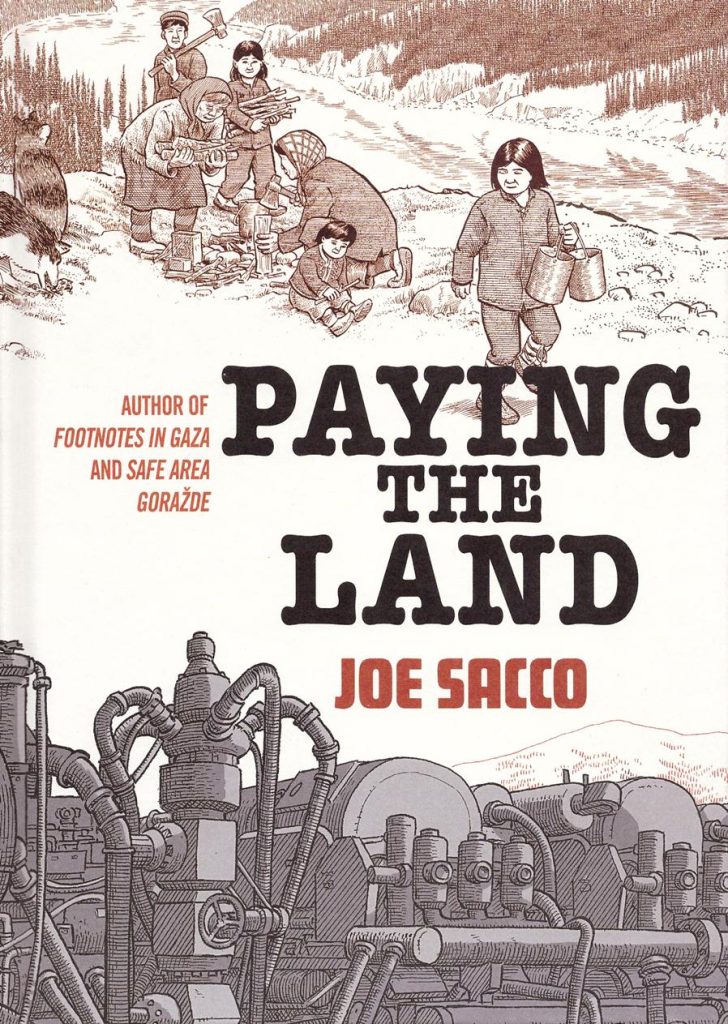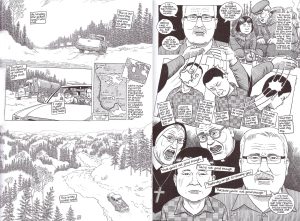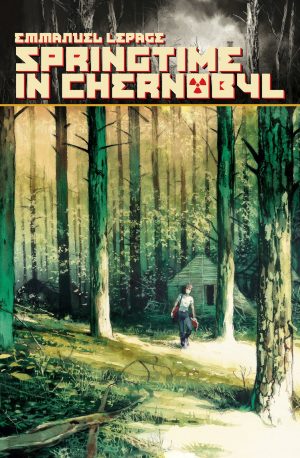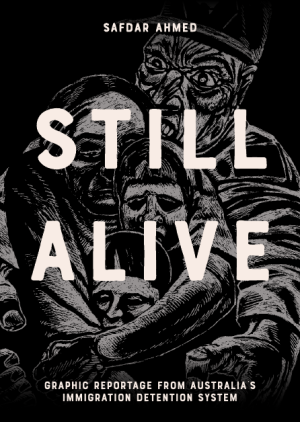Review by Frank Plowright
When considering people who’ve lived a life for centuries that’s now being disrupted by “progress”, the tendency is to look beyond the North American continent, which isn’t always the case. First Nation residents of Canada’s Northwest Territories refer to themselves as Dene, and their lives for a few generations now have been a balance between respecting the land and cultural encroachment. They’ve co-opted what’s made their lives easier from stoves and tents to snowmobiles, but their relationship with forms of the mining industry is troubled. As natural resources beneath the Earth’s surface become scarcer, drilling occurs in less accessible locations, and that’s divided communities into those believing protecting the land is paramount and those whose priority is the increased employment available.
Joe Sacco travels to frozen areas of Northern Canada to hear the pros and cons. He views this as another form of the colonialism that’s afflicted indigenous people for centuries, placing it in context, and after a while the realisation dawns that battles with guns and mortars aren’t being fought, but this is nonetheless a warzone, just spread over a vast square mileage. As with the other projects, Sacco opens eyes, challenges viewpoints and reels out ways of life currently undergoing homogenisation. This is achieved via observation and listening to elders talk of their youth, and you can imagine Louis Theroux supplanting Sacco. Almost everyone balances loss with benefit, and factors cost versus convenience and sustainability into the equation, which in a nutshell is the conflict playing out.
Sacco sorts his material broadly topic by topic, not glossing over the unpalatable. The section about alcohol abuse and physical abuse is distressing, and leads to the even more upsetting discussion about the longstanding policy of providing education to the Dene. This was carried out in the most dehumanising way, and prioritising the cruelty of a supposedly loving God’s human representatives. It carried on until the late 20th century, and whether intended or not, also created a gulf when the children returned home. When compensation was finally paid, averaging $90,000 per person, alcohol problems in indigenous communities vastly increased, but Sacco’s interviews enlighten about many other lifetime consequences that fly under the radar.
Sacco’s art is now instantly recognisable. Montages, erratically placed lettered captions and expressive cultured portraits are all present, an additional task being to present people not only as they look in the 2010s when interviewed, but how they looked when younger. There are no shortcuts in his work-intensive style over the years. Sacco knows what transmits, and sticks to it, which applies to his reportage also. He lets people describe their experiences and that individual touch, the type often dismissively derided as “anecdotal” by officials, gives Paying the Land its power. It would also be dismissive to lump together everyone living in a vast, sparsely populated area. Sacco specifies different groups of people with broadly similar cultures, but all seem to experience younger people not wanting to be part of a community ethic, and the blight of drink and drugs.
There’s a greater immersion than on previous projects, with Sacco not just the interested observer and interviewer, but co-opted into helping out with tasks on occasion, providing brief practical integration. The thoughts people have regarding solutions to a range of divisive problems are accessibly presented and while Sacco doesn’t impose himself, he will comment. One solution to almost all the problems is plain respect for others and the way they want to live, yet simple as that is, greed trumps it every time. Informative, engaging and needed, Paying the Land does the Dene proud.







